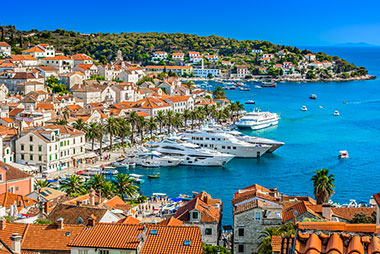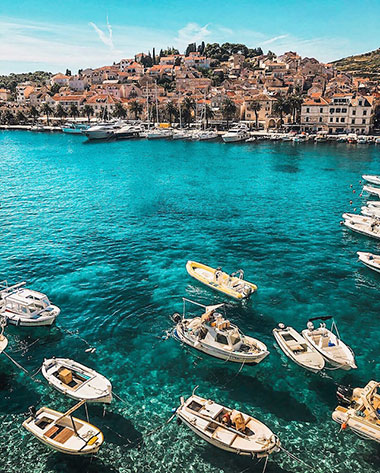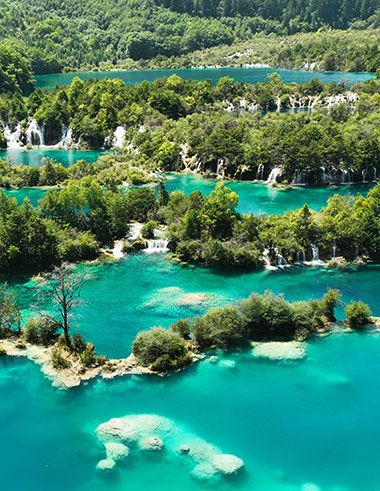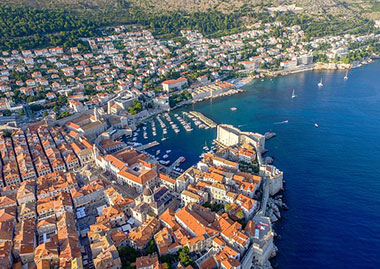Travel > Europe > CroatiaCroatiaHistorical Treasures, Idyllic Islands, and Culinary DelightsStep into the enchanting world of Croatia, a country that beckons retirees with its diverse range of beautiful destinations. From historic landmarks to breathtaking natural beauty and captivating cultural experiences, Croatia has it all. Delve into the winding streets of charming cities or unwind on serene coastlines. Whether you crave relaxation, exploration, or a delightful fusion of both, Croatia promises an array of activities and attractions perfectly tailored to the preferences of retirees. Get ready to immerse yourself in the allure of Croatia as you embark on a journey of discovery, embracing the rich tapestry of its cities, towns, and awe-inspiring landscapes. Dubrovnik
Split
Zagreb
Zadar
Pula
Rovinj
Opatija
Plitvice Lakes National Park
Hvar
Best Time to Visit:The best time to visit Croatia largely depends on your preferences and the activities you plan to engage in. Here are some considerations for each season: Winter (November to March): Croatia experiences a mild Mediterranean climate along the coast, but winters can be colder, especially in the inland and mountainous regions. Winter is an excellent time to visit for those interested in cultural exploration, winter sports like skiing in the mountains, or experiencing festive events and Christmas markets in cities like Zagreb and Split. Spring (April to May) Spring offers milder temperatures, fewer crowds, and more affordable prices compared to the summer months. Spring is particularly beautiful as the landscapes blossom with vibrant colors, and it's a great time for outdoor activities such as hiking and exploring national parks. Summer (June to August): The summer months are the peak tourist season in Croatia due to the warm weather and the opportunity to enjoy the stunning Adriatic coast. This period offers ideal conditions for beach activities, swimming, and sailing. However, popular destinations can be crowded, and prices may be higher. It's advisable to book accommodations and activities in advance if planning to visit during this season. Autumn (September to October): Autumn brings pleasant weather for sightseeing, wine tasting, and enjoying the harvest season. There are also fewer crowds, and more affordable prices than during Summer. Winter (November to March): Croatia experiences a mild Mediterranean climate along the coast, but winters can be colder, especially in the inland and mountainous regions. Winter is an excellent time to visit for those interested in cultural exploration, winter sports like skiing in the mountains, or experiencing festive events and Christmas markets in cities like Zagreb and Split. Travel Planning Tips:Currency: The official currency in Croatia is the Croatian Kuna (HRK). It's advisable to exchange some currency upon arrival or withdraw cash from ATMs, as some smaller establishments may not accept credit cards. Major credit cards are widely accepted in most tourist areas. Language: The official language in Croatia is Croatian. While English is commonly spoken in tourist areas, learning a few basic Croatian phrases can enhance your interactions and show respect for the local culture. Dress Code: Croatia has a relaxed dress code, especially in coastal areas. Casual and comfortable attire is generally acceptable. However, when visiting religious sites or more formal establishments, it's recommended to dress modestly and cover your shoulders and knees. Local Cuisine: Croatian cuisine is diverse and delicious, with a focus on fresh seafood, grilled meats, olive oil, and local produce. Don't miss the opportunity to try traditional dishes like peka (baked meat or seafood), seafood risotto, and various regional specialties. Pair your meals with local wines or rakija (fruit brandy) for a complete culinary experience. Tap Water: Tap water in Croatia is generally safe to drink. You can refill your water bottle from tap sources without an concerns. If you prefer bottled water, it is widely available in stores and restaurants. Travel Insurance: It's advisable to have travel insurance that covers medical expenses and trip cancellation or interruption. Ensure that your insurance policy provides adequate coverage for your specific needs and activities. Local Customs and Etiquette: Familiarize yourself with the local customs and etiquette in Croatia. It's customary to greet people with a handshake and to say "Dobar dan" (good day) as a common greeting. Tipping is appreciated but not mandatory, with around 10% being a standard tip in restaurants. Wi-Fi and Internet Connectivity: Most hotels, restaurants, and cafes in Croatia offer free Wi-Fi access. However, if you need continuous internet access while traveling, consider getting a local SIM card or portable Wi-Fi device for reliable connectivity. Travel Documents: Ensure that your passport is valid for at least six months beyond your planned departure date. Additionally, check visa requirements based on your nationality and the duration of your stay. EU and Schengen area citizens do not require a visa for short stays. Remember to check the latest travel advisories and guidelines from your country's government before your trip to Greece, as situations and requirements may change. Accommodations:Retirees visiting Croatia have a variety of accommodation options to choose from, ranging from luxury hotels to cozy guesthouses. When choosing the best accommodation, consider your budget, desired level of luxury, and the experiences you wish to have during your stay in Croatia. Some accommodation options that are available include:Hotels: Many hotels in Croatia offer a blend of modern amenities and some offer stunning views of the Adriatic coastline, making these ideal for travelers seeking comfort and convenience. Bed and Breakfast/Guesthouses: These options may provide a more personalized experience, often hosted by friendly locals who can offer valuable insights into the local culture and hidden gems. Coastal Resorts: These are perfect for those looking to indulge in sun, sea, and sand, offering direct access to the beach and a range of water-based activities. Apartment Rentals: Rentals offer a home-away-from-home experience, ideal for families or groups looking for a self-catering option with plenty of space. Spa Resorts: Spa Resorts in Croatia provide relaxation and rejuvenation in beautiful natural surroundings, featuring wellness facilities and therapeutic treatments for a truly revitalizing vacation. Transportation:Domestic Flights: Croatia has several international airports, including Zagreb, Split, Dubrovnik, and Zadar, making it easy to reach different regions of the country. Consider booking flights that align with your preferred destination and itinerary. Trains: Croatia has a limited train network, with major lines connecting major cities like Zagreb, Split, and Rijeka. However, train travel may not be the most efficient mode of transportation within the country. Ferries: Croatia's stunning coastline and numerous islands make ferry travel a popular option. Ferries operate between mainland cities and various islands, providing an opportunity to explore the beautiful Adriatic Sea. Buses: Buses are a popular and reliable means of transportation in Croatia. The country has an extensive bus network, connecting various cities and towns. Companies like Autotrans, Arriva, and FlixBus operate frequent routes with comfortable buses. Rental Cars: Renting a car is a convenient option for tourists in Croatia, offering the freedom to explore at your own pace. Major cities and airports have rental car services available, and it's advisable to compare prices and book in advance. Keep in mind parking challenges in cities and ensure you have the necessary documentation, including a valid driver's license and international driving permit if required. Croatia boasts breathtaking scenic routes, such as the Adriatic Coastal Road or the Plitvice Lakes National Park area. You can take your car on ferries to islands like Hvar, Korčula, or Brač, and discover their stunning beaches, charming towns, and hidden coves. Taxis: It's important to ensure that you choose licensed taxis to ensure safety and fair pricing. Licensed taxis have a clearly displayed taxi license number and a meter inside the vehicle. Confirm the payment options with the driver before starting the journey to avoid any inconvenience. Most accept cash, but many also accept credit cards. As with any taxi service, it's essential to exercise caution and ensure your safety. Use licensed taxis, verify that the driver's identification is displayed, and avoid sharing taxis with strangers, if possible. Remember to check official travel websites and consult with local authorities for the most up-to-date information and guidance regarding transportation options and safety tips during your visit to Croatia. Safety Tips:
|
 Beautiful Hvar, Croatia Beautiful Hvar, CroatiaPhoto by Dreamer4787/iStock  Photo by Vincent Rivaud Photo by Vincent Rivaud  Plitvice Lakes National Park Plitvice Lakes National Park Photo by Chasing Lyu  Aerial view of Dubrovnik Aerial view of DubrovnikPhoto by Ivan Bagić | |||||||||||||||||||||||||||||